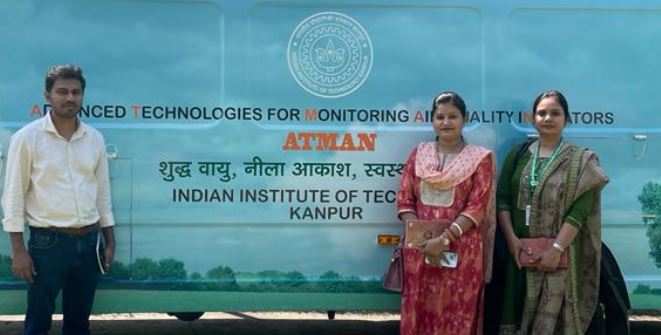
The Indian Institute of Technology Kanpur (IITK) has established a Center of Excellence (CoE) named ATMAN (Advanced Technologies for Monitoring Air-quality iNdicators). The CoE is a significant step towards the Atma Nirbhar Bharat initiative of the Government of India, focusing on building indigenous low-cost sensor manufacturing and Artificial Intelligence/Machine Learning (AI/ML) capabilities to enhance air quality across urban and rural areas of India.
The CoE ATMAN aligns with the vision of the Principal Scientific Advisor of India, aiming to translate sustainable technologies and business models into practical products and services accessible to millions globally.
Supported by philanthropic entities, including Bloomberg Philanthropies, Open Philanthropy and the Clean Air Fund, ATMAN aims to address critical air quality challenges with cutting-edge technology.
Prof. Ajay Sood, Principal Scientific Adviser to the Government of India said, “The CoE ATMAN has been setup to strategize and execute projects in the field of air quality with indigenous sensor manufacturing that is scalable globally. I appreciate the nurturing of Indian start-ups by this Centre. The coordination between science and government agencies is at the centre of citizens’ welfare. I take this opportunity to congratulate IIT Kanpur, the funders, and government agencies for contributing towards this endeavour.”
There are several projects that are currently underway at the ATMAN. The Ambient Air Quality Monitoring of Rural Areas using Indigenous Technology (AMRIT) is a flagship project that will deploy a dense Sensor Ambient Air Quality Monitor (SAAQM) network with 1,400 nodes across rural areas in the states of Bihar and Uttar Pradesh. This initiative is the first of its kind to monitor air quality comprehensively in these regions, where data has been limited to cities and towns. The CoE team will be working with the State Pollution Control Board of Bihar and Department of Environment, Forests & Climate Change, Government of Uttar Pradesh on AMRIT to enhance air quality action in these states.
The Dynamic Hyper-local Source Apportionment (DHSA) is a cost effective approach to source apportionment that is currently being pioneered in Lucknow and Kanpur in Uttar Pradesh. The data from DHSA will enable city authorities to make informed decisions in their air quality action planning. The long-term vision is to scale DHSA systems across cities in India to inform about emission and sources of air pollution on a dynamic scale based on this project.
The PM2.5 Prediction and Airshed Management is a project that utilizes micro-satellite imagery, sensor-based ambient air quality networks, and machine learning to predict PM2.5 levels at finer resolutions. Additionally, the CoE is developing an airshed approach to address air pollution on a larger scale with data-driven policy decisions.
The CoE is at the forefront of indigenous air quality sensor fabrication, combining it with artificial intelligence and machine learning models to ensure precise and reliable results. The technology’s optimization involves careful sensor placement to maximize overall citizen satisfaction with air quality information available to the public.
Prof. Sachchida Nand Tripathi, who heads the Center of Excellence (CoE), expressed enthusiasm for the impactful research that is underway, “CoE ATMAN is spearheading the infusion of Indigenous Technology towards an Atmanirbhar Bharat. Association of State Government Departments in Bihar and UP, is helping bridge the gap in data driven Air Quality Management (AQM) policy.”








